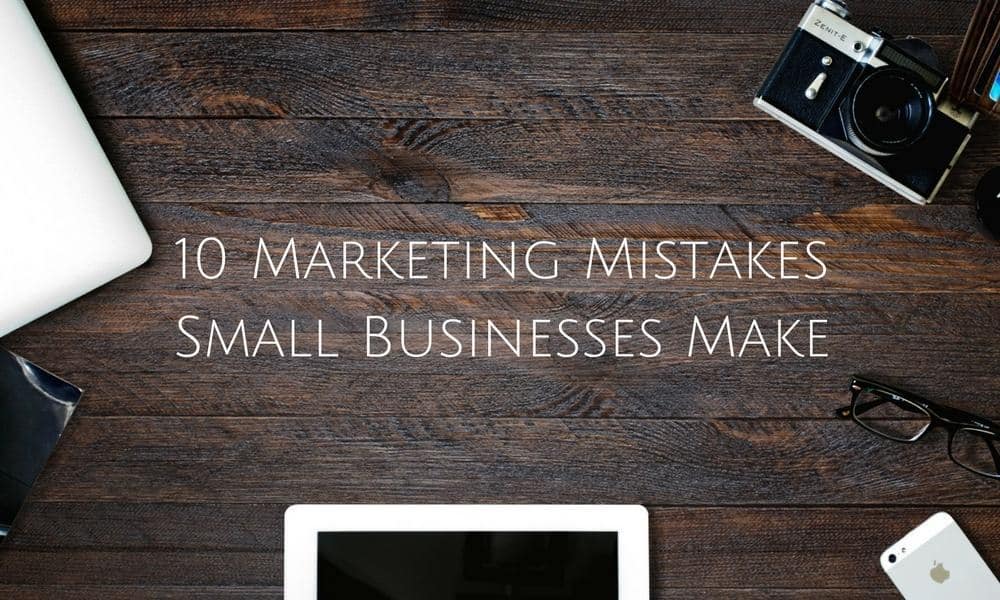Starting up a business is no easy task—but marketing the right way (and with the right tools) will help you avoid business blunders. These 10 marketing mistakes small businesses make are common—but avoidable.
Top Marketing Mistakes Small Businesses Make
Not understanding your audience
A lot of entrepreneurs assume that their work is finished once customers start buying and using their products. However, this is a misconception. The work has just started! Studies have shown that loyal, returning customers may be worth up to 10x as much as their initial purchase. Treat them well, and you’re likely to have a higher probability of selling to them again than to a brand new prospect.
Pay more attention to existing customers. This segment of customers, if satisfied with your brand, might even become brand promoters for your business.
It’s also crucial to take a look at your customers (and target audience) as a whole.
Aside from the already existent needs of potential customers or end users, entrepreneurs must profile prospects. How do they spend their time? What other products or services will they likely want? Where does your audience tend to live? This informs your marketing efforts, and renders them more accurate.
Spending too much time on perfecting your brand
Too many entrepreneurs and startups want to spearhead rebranding efforts right away, or adjust the website over and over. Trying to perfect your brand can lead to wasted money (unless you enlist the help of an SEO agency like Markitors).
Avoid zooming in so closely on your brand, especially on social media. Customers may simply tune out, or disregard your brand altogether. It doesn’t provide value to the customers, so focus less on building your brand and share content online that behooves your customer base.
Don’t delay launching a site only because you wish to perfect the copy and the design. As you get going, you can make those adjustments from a more stable standing. You can also start to educate yourself more about what your followers want to hear about the brand and the industry, so that you avoid drowning them during your business launch.
Having no social media strategy
Social media is a totally free marketing tool (aside from paid promotions, if you wish to take that route), so it only makes sense to increase your exposure in that realm. But be wary of signing up for everything at once; social media takes time and strategizing. A digital marketing company can help you as an entrepreneur, especially because when you start up a business, every second counts. Thus, you may not have a ton of time to manage a million social platforms—unless you get help from a professional digital marketing company that swiftly schedules everything out for you.
Forgetting a call to action
Let’s say a prospective customer views your ad or visits your website. What do you want this person to do? Subscribe to an email newsletter? Sign up for a giveaway or promotion? Without a clear call to action, your customers will not know what to do, so they might move on. Then, you have lost your opportunity for their business.
Use a call to action button on your website. This could be an opt-in popup that collects email addresses. This would create a tandem benefit; for you, it’s a way to get more exposure through email marketing with those new emails. For the customer, it means useful information, a promotion, special deals and discounts, and so on.
A button that says “Click Here” signals a sign-up for a newsletter, or whatever your goal is. Cadence Education does a great job of this with its “Find Your School” header. Help your customers find you, or else they likely will fail to find you at all.
Forgetting that content is king
In the music industry, Elvis is king. But when it comes to digital marketing, content rules all. Content serves as the foundation for any winning digital marketing campaign. But what’s more, the information or media involved needs to be engaging, relevant and insightful. If you fail to pay attention to what you’re putting out there, you can post links, graphics or videos all day, and still not view any measurable results.
Pinpoint the content that will turn website visitors into real customers.
Video content is particularly becoming a necessity of digital marketing. One of the top marketing mistakes small businesses make is ignoring its value. Thus, entrepreneurs should start producing video content with campaigns on Snapchat, Instagram (as posts and stories), Vine, and YouTube. These provide a cost-effective and successful way to hit home with your audience.
Not taking advantage of email marketing
The money is in the email list. Really.
Studies show that 80% of businesses report that email marketing is directly tied to their primary revenue. (Did you know Markitors = MailChimp email marketing experts?)
Most successful startups begin by collecting user email addresses. Studies have revealed that email often converts more users than search and social media combined. It’s a major source of traffic, and ignoring email is one of the biggest marketing mistakes small businesses make.
One of the keys to boosting sales via email reaches beyond just building an email list and hitting “send.” Rather, the key to making your email marketing shine is effectively segment out your email lists.
Instead of sending the exact same cookie-cutter email to everyone, segment your email list. Consider categories like user interest, location, age and gender to make sure you send only the most fitting email to anyone on your list.
Not Having a Blogging Strategy
According to Hubspot stats, businesses that blog get 67% more leads and 97% more links than businesses that neglect blogging. As an entrepreneur running a brand new business, it’s smart to start a blog and update it—but it’s not always that simple. It’s not that simple: You need a solid blogging strategy. Some tips:
- Make a connection between your blog and your business. Your blog has to get people to discover your business and/or your products. This is only doable if you connect it all. For starters, make sure there’s a link to your site/products throughout your blog. This should be present in your navigation bar, within your blog posts, in the sidebar, in key pages and so forth. The more routes people have to find what you’re selling via your blog, the better.
- Make sure there’s a relevance between your blog and your business: Your blog must address the problems customers face, and your solution to those issues.
- Quantity and quality reign supreme: Some studies show that 16+ blog posts per month is the most effective way to drive traffic to your site. According to Hubspot, you’d generate up to 4x the traffic and leads as businesses that blog fewer than 4x per month.
Not using (or misusing) the right social media platforms
Social media platforms are a fun and fast way to market your company, but focusing on too many at once can weaken the overall campaign. Try to keep your social media strategy targeted at the few social media platforms your audience frequently uses, and deliver relevant information through them on a regular basis.
Build a social media strategy that makes sense for your brand and market, not necessarily the platforms that are trending right now. Twitter, Facebook, and Snapchat are great social media platforms to start with, but depending on your business audience, you many want to consider LinkedIn, Instagram or Pinterest.
Neglecting the numbers
Studies show that 84% of businesses aren’t tracking ROI from their social media marketing efforts.
Nearly every analytics tool will let you keep track of where your customers are coming from, and they will also let you create goals and set up conversion tracking.
One of the biggest marketing mistakes small businesses make? Completing a marketing campaign and realizing you haven’t a clue if it “worked” or not. You also aren’t sure how to improve it for next time.
How many people who found out about your business through a certain campaign actually went on to purchase something? Also, how many found out about you via other—more or less costly—methods?
Understand what to measure, how to measure it, and try changing one variable at a time. That way, you can pinpoint what works and how it impacts your business.
Spending too much on “big marketing” right away
Start slow. You’d hate to blow your budget so soon.
If you do overspend on your marketing, it could turn out to be a huge success. But you may also find yourself incapable of meeting the accompanying demand, since you went over your budget.
Spend some time testing out tools that might work for your marketing efforts before you make any big decisions. Test out your audience. Who are your buyers? One of the most detrimental marketing mistakes small businesses make is assuming and gambling that something will work. Spend a little bit of money on hyper-targeted marketing. Focus on content creation and content marketing. Then, try some PR, and take advantage of free video to disseminate your company’s message.
Do you have any other marketing mistakes small businesses make? Let us know!
Markitors is an SEO agency that moves small businesses forward online.








